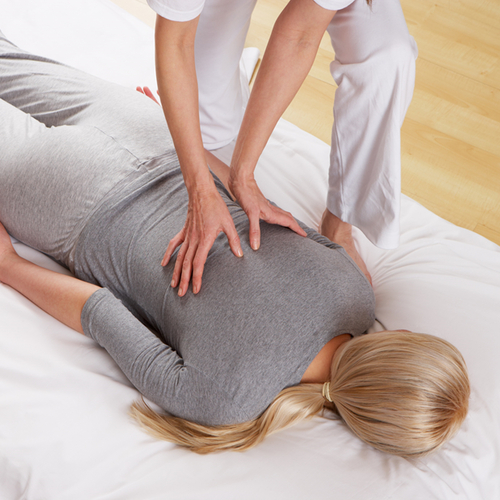
Shiatsu
Alternate names: Asian Bodywork, Asian Bodywork Therapy, Bodywork Therapy, Energy Health, Energy Medicine, Energy Work, Finger Pressure, Japanese Shiatsu, Médecine Énergétique, Meridian Shiatsu, Movement Shiatsu, Namikoshi Shiatsu, Ohashiatsu, Quantum Shiatsu, Santé Énergétique, Shi-astsu, Shiatsu Japonais, Shiatsu Massage, Shiatsu des Méridiens, Shiatsu Ryoho, Shiatsu Therapy, Shiatsupractor, Tao Shiatsu, Thérapeute en Shiatsu, Tsubo Shiatsu, Zen Shiatsu
Background
Shiatsu is a form of Japanese massage. It involves using the fingers and palm of the hand to apply pressure to specific points on the body. Over the years, different types of shiatsu have been developed. Meridian shiatsu, for example, focuses on the meridians used in Traditional Chinese Medicine (TCM). In TCM, meridians are invisible lines on the body that are thought to carry energy.
Shiatsu is used for pain, osteoarthritis, and many other conditions, but there is no good scientific evidence to support these uses.
Shiatsu was developed by Tokujiro Namikoshi, who founded the Japan Shiatsu College in 1940. He is famous for providing shiatsu treatments to celebrities such as Muhammad Ali and Marilyn Monroe.
Modern day practitioners of shiatsu are known as "Shiatsupractors." However, official recognition and licensure standards, when they exist, are inconsistent and differ significantly depending on the state or country.
Shiatsu is used for pain, osteoarthritis, and many other conditions, but there is no good scientific evidence to support these uses.
Shiatsu was developed by Tokujiro Namikoshi, who founded the Japan Shiatsu College in 1940. He is famous for providing shiatsu treatments to celebrities such as Muhammad Ali and Marilyn Monroe.
Modern day practitioners of shiatsu are known as "Shiatsupractors." However, official recognition and licensure standards, when they exist, are inconsistent and differ significantly depending on the state or country.
Safety Safety definitions
Shiatsu is LIKELY SAFE for most people. But if shiatsu massage is given with too much force, it can damage the nerves and muscles. There have also been rare reports of shiatsu massage causing strokes and blood clots.
Surgery: Therapists should be very careful applying shiatsu to patients that have had surgery. Surgical sites can be damaged.
Special Precautions & Warnings:
Pregnancy and breast-feeding: Shiatsu is POSSIBLY SAFE for women who are pregnant or breast-feeding.Surgery: Therapists should be very careful applying shiatsu to patients that have had surgery. Surgical sites can be damaged.
Effectiveness
NatMed Pro rates effectiveness based on scientific evidence according to the following scale: Effective, Likely Effective, Possibly Effective, Possibly Ineffective, Likely Ineffective, Ineffective, and Insufficient Evidence to Rate.
Possibly effective Effectiveness definitions
- Childbirth. Shiatsu techniques might help to start labor but do not seem to reduce labor pain.
Insufficient evidence Effectiveness definitions
- Alzheimer disease. Adding shiatsu massage to exercise seems to improve depression but not thinking, memory, or body function in people with Alzheimer disease.
- Back pain. Early research shows that shiatsu massage might reduce pain and anxiety in some people with low back pain.
- Pain. Early research shows that self-administered hand-shiatsu massage before bed does not improve sleep or pain in adults with chronic pain.
- Quality of life. Early research shows that shiatsu massage might improve energy, confidence, and mobility in people receiving palliative care.
- Schizophrenia. Early research shows that shiatsu massage might improve symptoms such as psychosis, depression, and anxiety in people with schizophrenia.
- Muscle pain (myalgia).
- Osteoarthritis.
- Rheumatoid arthritis (RA).
- Injuries.
- Stimulating immune function.
- Other conditions.
Dosing & administration
The appropriate or safe use of shiatsu depends on several factors such as the condition being treated or the person administering the treatment. Be sure to seek and follow relevant directions from your physician or other healthcare professional before using this treatment.
Interactions with pharmaceuticals
It is not known if this treatment interacts with any medicines. Before using this treatment, talk with your health professional if you take any medications.
Interactions with herbs & supplements
There are no known interactions with herbs and supplements.
Interactions with foods
There are no known interactions with foods.
Action
Shiatsu involves using the fingers and palm of the hand to apply pressure to specific points on the body. This method of massage is thought to stimulate certain body functions to correct imbalances, stimulate immune function, promote general health, and prevent disease.
vital.ly has licensed monographs from TRC Healthcare.
This monograph was last reviewed on 29/06/2023 10:00:00 and last updated on 21/12/2021 08:43:53. Monographs are reviewed and/or updated multiple times per month and at least once per year.
Natural Medicines disclaims any responsibility related to medical consequences of using any medical product. Effort is made to ensure that the information contained in this monograph is accurate at the time it was published. Consumers and medical professionals who consult this monograph are cautioned that any medical or product related decision is the sole responsibility of the consumer and/or the health care professional. A legal License Agreement sets limitations on downloading, storing, or printing content from this Database. No reproduction of this monograph or any content from this Database is permitted without written permission from the publisher. It is unlawful to download, store, or distribute content from this site.




